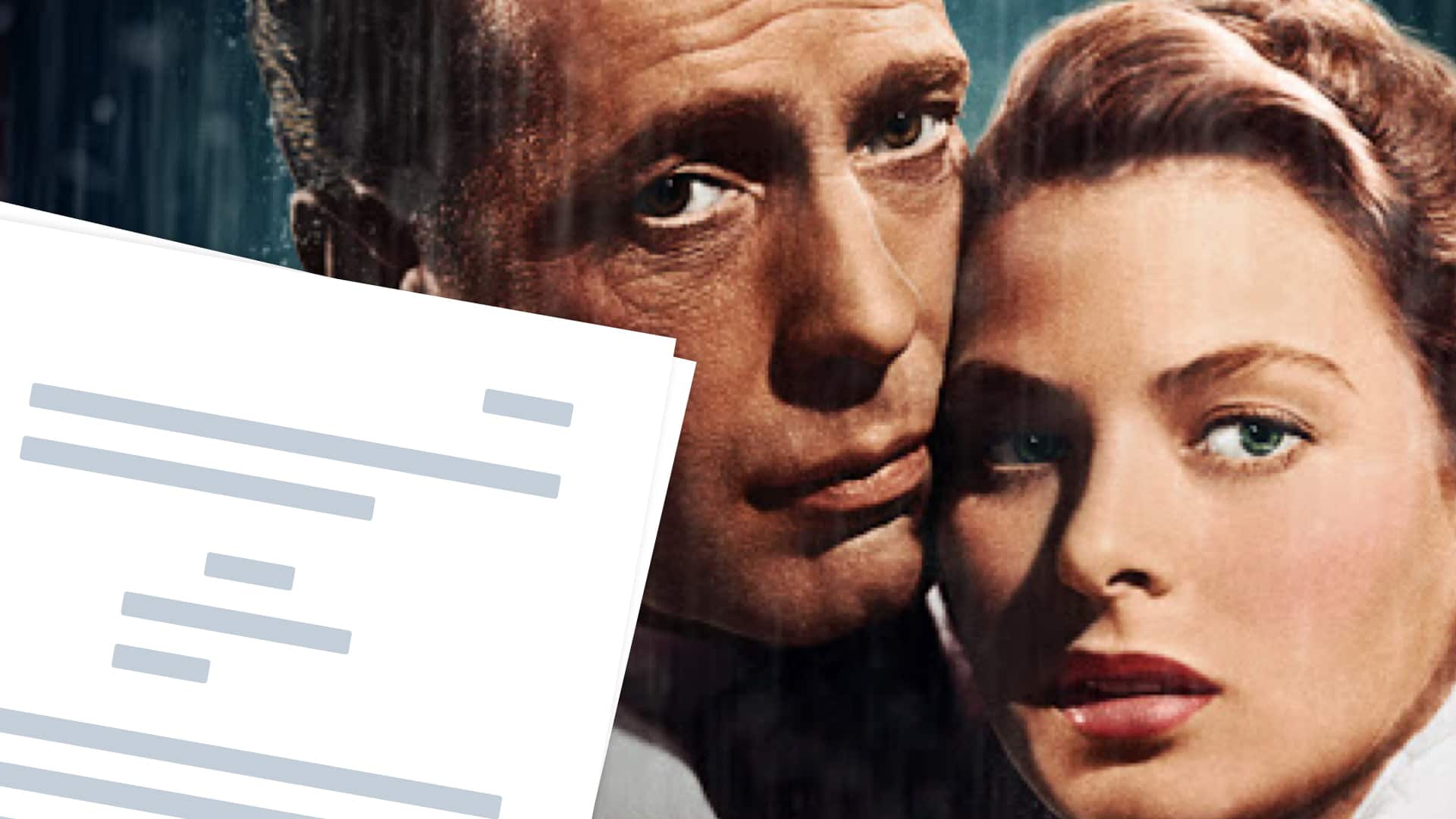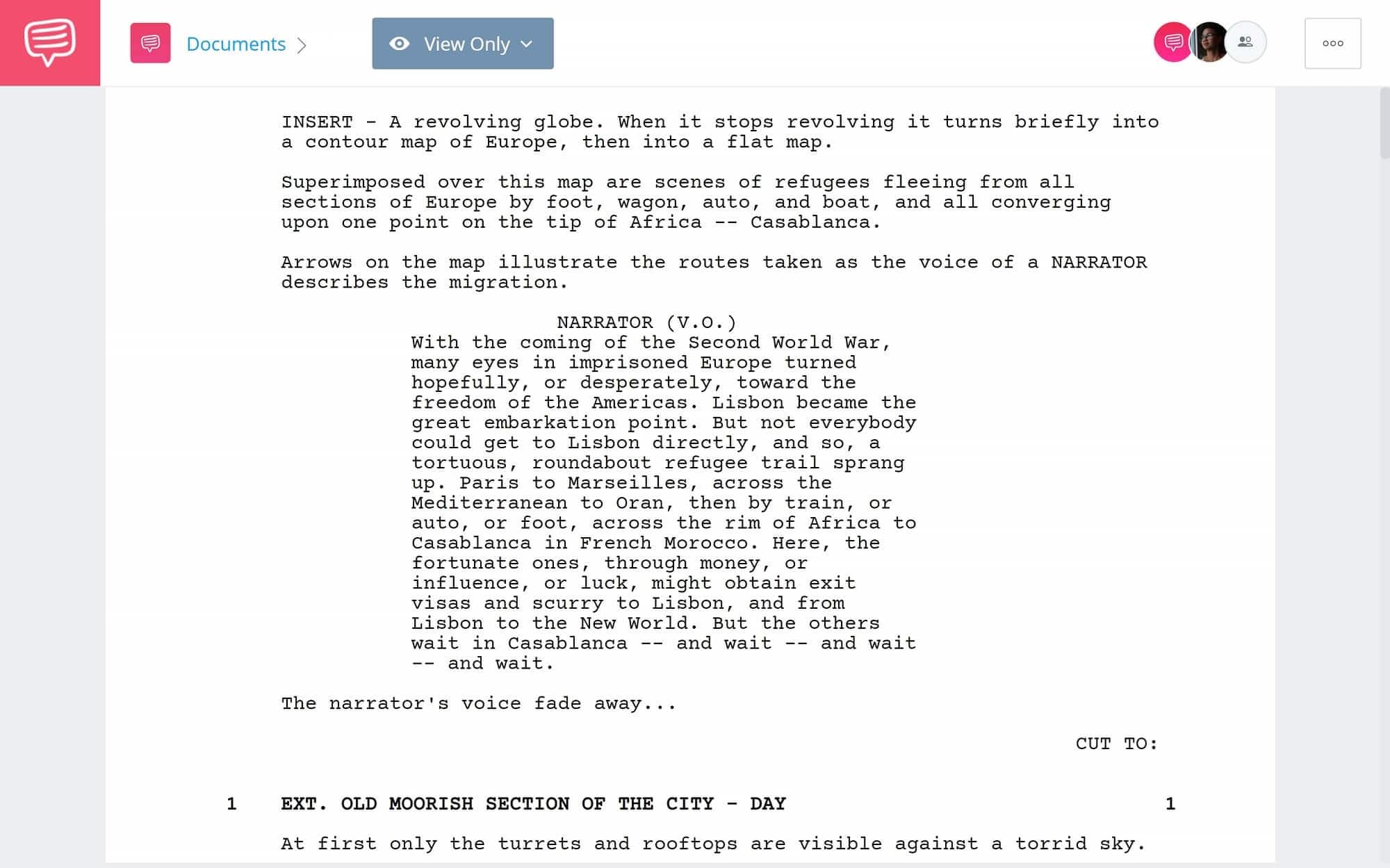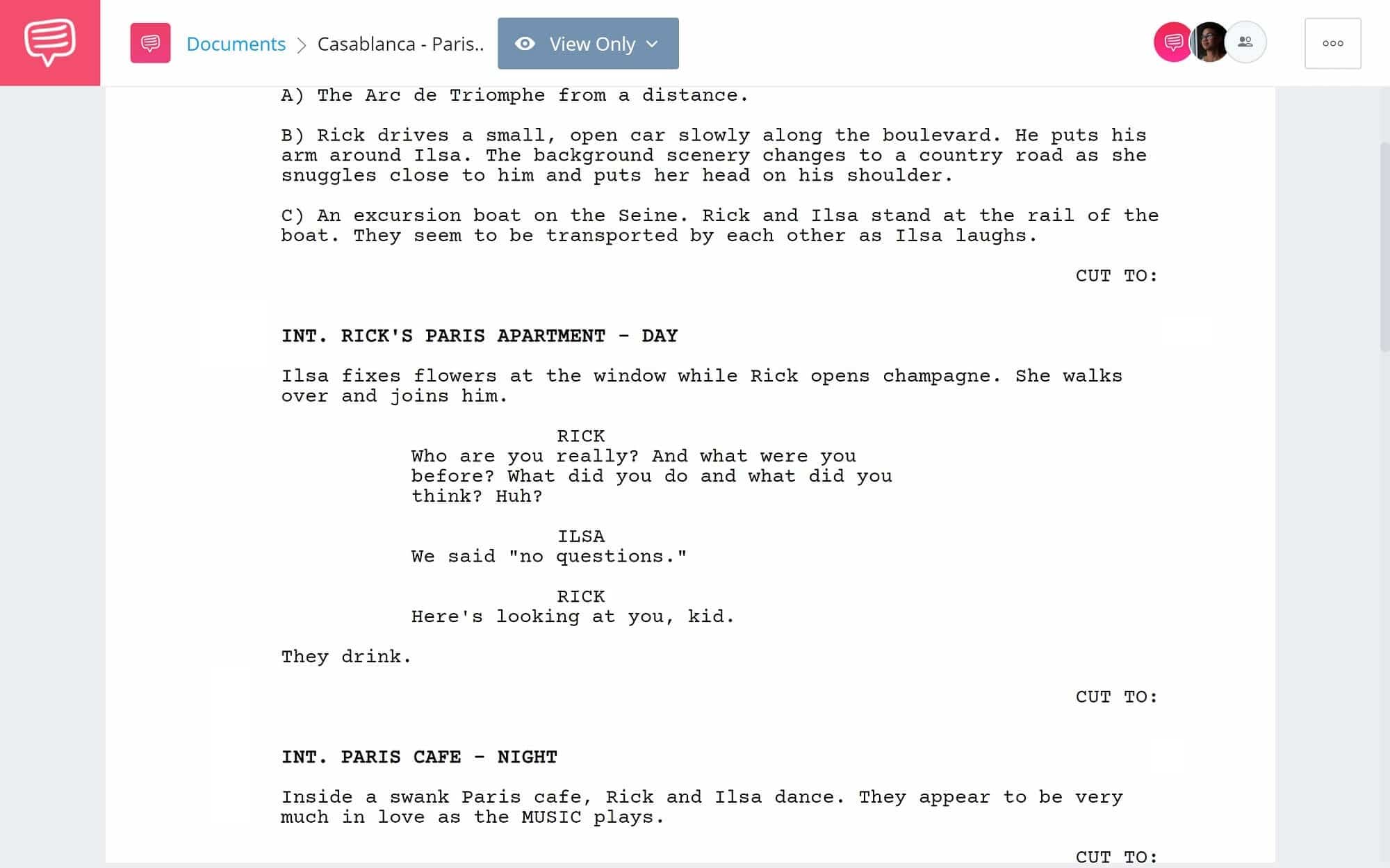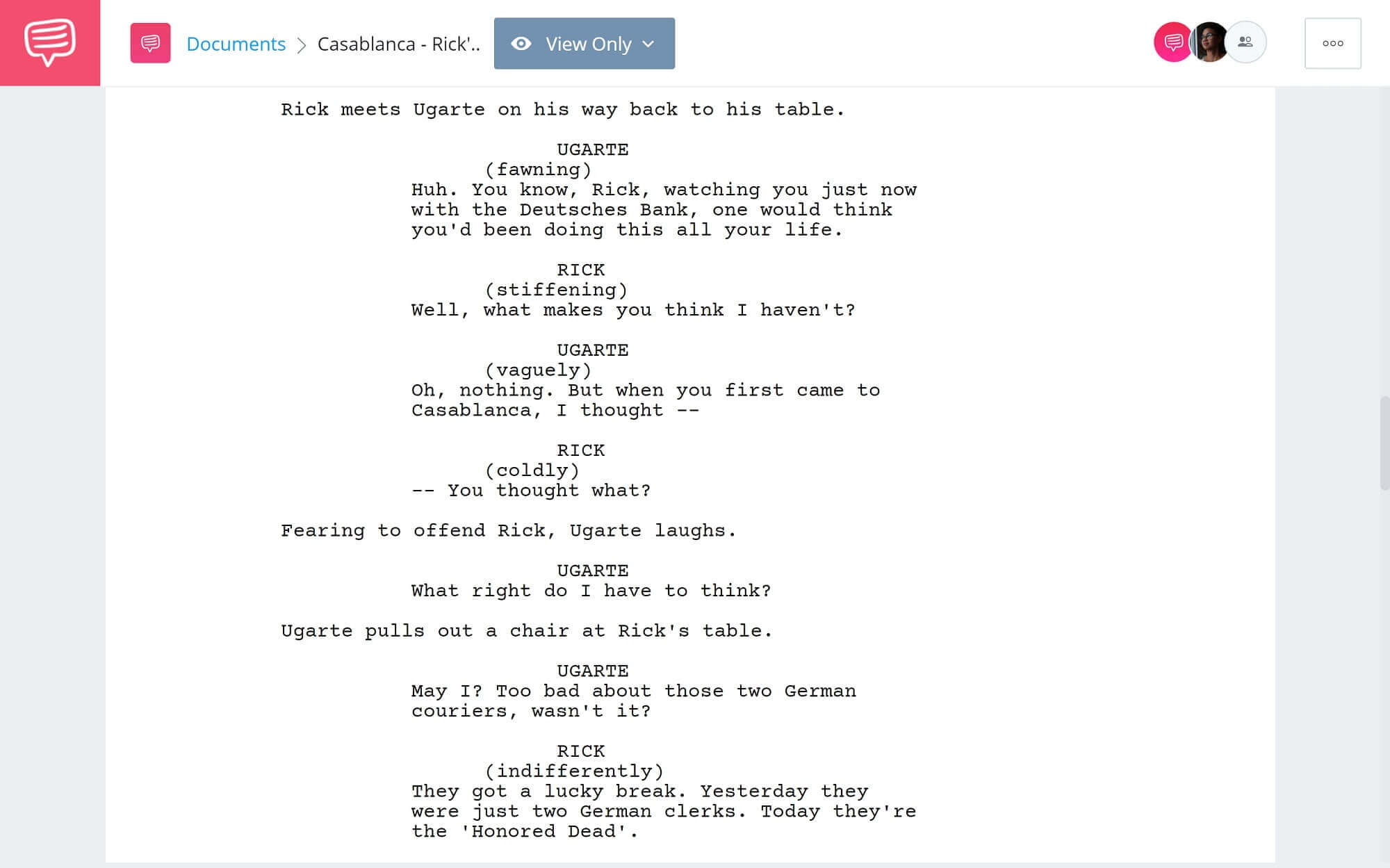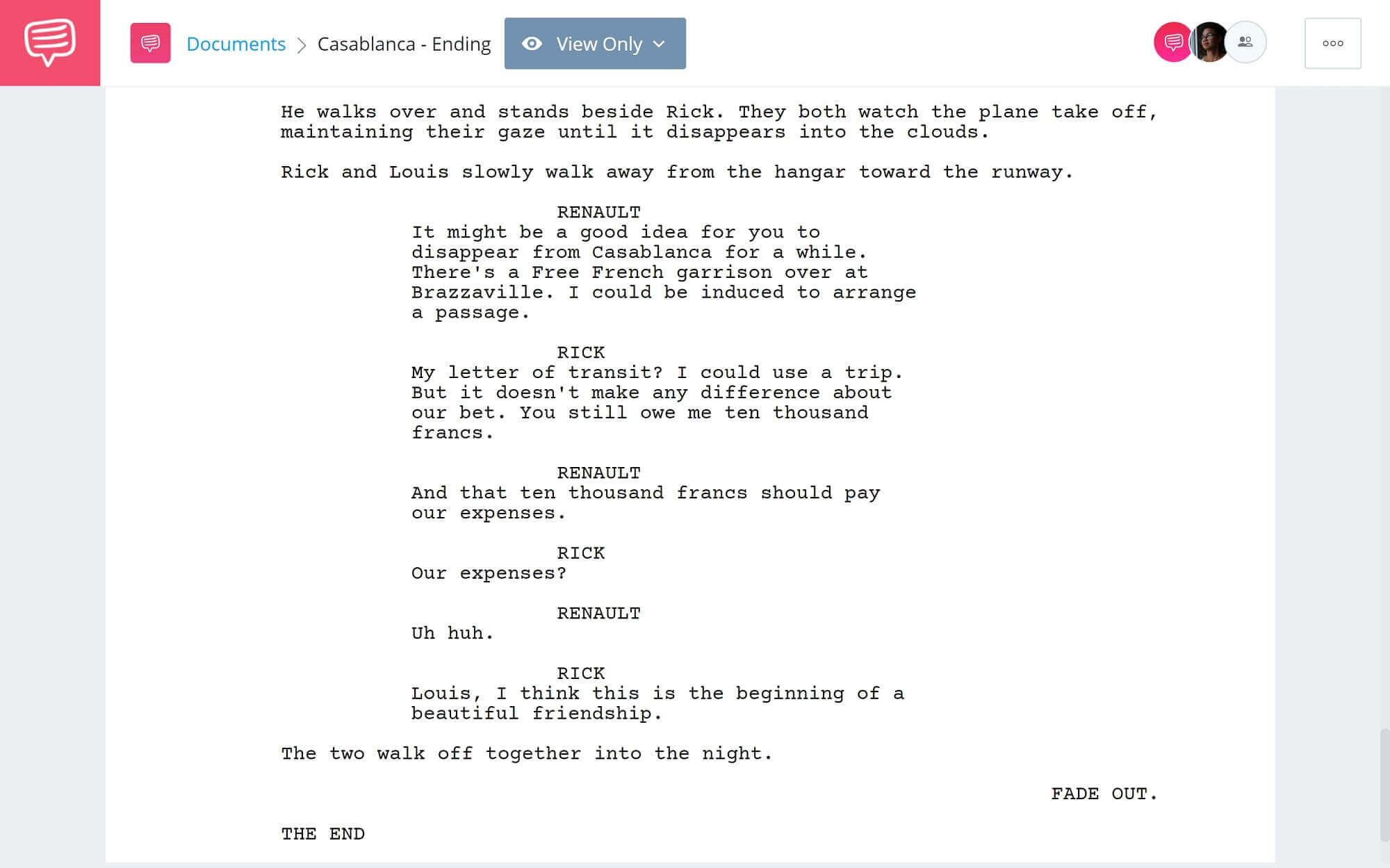Casablanca is widely regarded as one of the greatest movies ever made. But did you know that the Casablanca script was actually adapted from an unproduced stage play? We’re going to touch on the production history of the Casablanca screenplay but first, let’s remind ourselves of the plot, quotes, characters, and ending. Make sure to download a copy of the screenplay below to read along!
WHO WROTE casablanca SCRIPT?
Written by Julius J. Epstein, Phillip G. Epstein, and Howard Koch
Based on Everybody Comes to Rick’s by Murray Burnett and Joan Alison.
Julius Epstein was a four-time Academy Award nominated screenwriter with credits on acclaimed works like Four Daughters and Reuben, Reuben.
Phillip Epstein was a screenwriter and Julius’ identical twin brother. He died tragically at the age of 42 from cancer.
Howard Koch was a screenwriter who was blacklisted in 1951 by HUAC. He continued to write scripts abroad under various pseudonyms, until he moved back to America five years later.
CASABLANCA SUMMARY
STRUCTURE AND CASABLANCA SYNOPSIS
Here is the story structure for the Casablanca screenplay:
Exposition
The Casablanca setting is the eponymous city in Morocco. The African campaign of WWII is thoroughly underway. Thousands of people are desperately trying to escape to neutral territories but they don’t have the necessary letters of transit. An American named Rick owns and operates a club in Casablanca.
Inciting Incident
Two German couriers are killed for their letters of transit. The murderer, Ugarte, gives the letters to Rick to hold onto while he awaits their sale.
Plot Point One
A Czech revolutionary leader named Victor Laszlo arrives in Casablanca with his wife, Ilsa. They go to Rick’s club to buy the letters of transit but it’s revealed that Ugarte was killed by German soldiers.
Flashback
Prior to the German occupation of Paris, Rick and Ilsa were in love. As the Nazi troops prepared to march on the city, Rick and Ilsa hatched a plan to escape, but Ilsa never showed up.
Plot Building
Ilsa shows up to the club but finds Rick in a state of drunken belligerence. Rick blames Ilsa for his sorry state and laments the fact that she ever came to Casablanca.
Plot Point Two
The French Captain in charge of Casablanca, Louis Renault, works with the Germans to keep Laszlo in the city. It’s revealed that Rick used to be a gun-runner for Ethiopian freedom fighters, and not the neutral tactician many suspected he was.
Build Up
Laszlo confronts Rick and offers him large sums of money for the letters of transit. Rick refuses under the guise of neutrality, but his real intention is to get the truth out of Ilsa.
Climax
Ilsa demands that Rick give her the letters of transit. When Rick again refuses, she draws a gun on him. Rick tells her to shoot him to put him out of his misery, but instead they embrace.
Resolution/Falling Action
Ilsa reveals that during her time in Paris, Laszlo was in a concentration camp. When she met Rick, she was under the impression that Laszlo was dead. However, she later learned that Laszlo was alive, and abandoned her affair with Rick. Meanwhile, Laszlo is arrested and jailed.
Finale
Rick tells Renault he plans to leave Casablanca with Ilsa, but he asks that Laszlo be freed so that they can frame him with the letters of transit. At the airport, Rick instead gives the letters to Laszlo and Ilsa and stages a confrontation with Renault. Laszlo and Ilsa escape to America and Rick kills the German captain.
Denouement
It’s revealed that Rick and Renault staged the confrontation to push Ilsa into leaving with Laszlo. Renault says that Rick may have to leave Casablanca for a while. Rick responds by saying that he and Renault are going to begin “a beautiful friendship.”
Casablanca Script Analysis
Famous Casablanca quotes
Now that we’ve gone over the Casablanca summary, let’s dive into some quotes. Even if you’ve never seen Casablanca before or read the script, you’ve probably heard the quote “here’s looking at you, kid.” That’s because it's one of the most famous quotes in cinema history.
Although many know the quote from its final use in the film, “here’s looking at you, kid" is actually a callback to Rick’s sentimental-self from his time in Paris.
With the Casablanca script imported into StudioBinder's screenwriting software, we can examine these moments in-depth. Let’s take a look at the Paris flashback scene to see how the writers planted an unforgettable quote.
Casablanca Screenplay • Paris Flashback • Read Full Scene
The Rick that we see in this Paris flashback is very different from the Rick we see in Casablanca. The flashback serves to show how the heartbreak of being stood up by Ilsa turned Rick into a bitter man.
But when Rick says to Ilsa "here’s looking at you, kid" he reminds her that their love is in the present. No matter what happened in the past, no matter what happens in the future, the present is theirs.
Rick loses this wistful romanticism though. It’s not until Ilsa convinces Rick that she did truly love him that he regains it. Let’s see how this iconic moment came together in the final cut:
Casablanca • ‘Here’s Looking at You, Kid’
Using a callback is a great way to add emphasis to a script’s climax. It doesn’t have to be anything grandiose or poetic, just something that makes sense in the context of the story. So if you ever find yourself thinking, ‘how should I set up my callback?’ go back to Casablanca and listen to Rick’s sentimental side one more time.
Here are some more famous Casablanca quotes:
- “Tonight he’ll be at Rick’s. Everybody comes to Rick’s.”
- “I stick my neck out for nobody.”
- “Well, there are certain sections of New York, Major, that I wouldn’t advise you to try to invade.”
- “Please, Monsieur, it is a little game we play. They put it on the bill, I tear it up.”
- “Play it once, Sam, for old time’s sake.”
- “We’ll always have Paris.”
Related Posts
Defining Character in Screenwriting
Casablanca characters
In screenwriting, a ‘start part’ is a term that’s used to hype up an important character before they’re physically introduced. Rick in Casablanca is a great example of a start part and how to introduce a character in a screenplay.
Just think about the things that we hear about him before his introduction:
Renault tells the Germans that everybody goes to Rick’s club, which implies that he’s an important man, he runs a great club, or both.
A woman asks a waiter if Rick will have a drink with her, to which he responds "Madame, he never drinks with customers." This gives us a sense that he’s some sort of solitary, mysterious character.
So, by the time he’s introduced, we’re already interested in who he is, what he wants, and why people gravitate towards him. The other Casablanca characters are there to support Rick’s grand entrance.
This sets him up for easy characterization. Let’s take a look at the scene in which Rick’s introduced to see how the writers use ‘actions’ to define his good nature.
Casablanca Screenplay • Read Rick’s Introduction
Here, Rick is characterized by how he interacts with other Casablanca characters. We already know there’s an air of mysticism to him, but without seeing him in action, we’re not sure as to whether or not his deeds are genuine. Each interaction in this scene displays Rick’s good nature — but they also show that he’s respected.
However, his good intentions are often shielded by a rough exterior. Let’s take a look at a quick snippet from this scene to see how Rick acts in a genuine way that comes across as cold.
Casablanca Characters • ‘She’s Had Too Much to Drink’
All of this characterization is done within the first twenty pages of the script. The key takeaway from this is the way Casablanca characters are built: the faster you’re able to define your characters, the better chance you’ll have at retaining the interest of readers.
How to Find Resolution
Casablanca ending explained
It’s no secret that Casablanca is a propaganda film. The original play, Everybody Comes to Rick’s, was written in 1940, prior to U.S. intervention in World War II. But it was very clear that Everybody Comes to Rick’s was an anti-Nazi story.
By the time Warner Bros. had bought the rights to the play, the U.S. had joined the Allied war effort. Back then, studio films often echoed sentiments of public discourse. Many people in America were still in favor of isolationism. Either they weren’t informed of the horrors of the war, they were ignorant to them, or they were uninterested in them.
Cinema was one way in which the masses were educated and inspired to take action. Let’s revisit the Casablanca ending through the lens of propaganda criticism.
Casablanca Screenplay • Read the Ending
The Casablanca plot is very much centered on Rick and Ilsa’s relationship, but that plot is resolved before the ending. The last section of the script, the denouement, focuses on the resolution of topics of war.
After Ilsa and Laszlo leave, the only characters that remain are Rick (an American), Renault (a Frenchman), and Strasser (a Nazi). So, what happens between these three characters? Let’s take a look:
Casablanca Final Scene Script • ‘A Beautiful Friendship’
With this ending, we see Rick abandon his solitary, isolationist ways and rejoin the fight. Does his character arc remind you of anybody? Ah yes, in many ways, Rick is a character conduit for U.S. foreign policy.
His decision to forsake himself for the good of the Allies is viewed by many to be propaganda — a purposeful statement intended to influence the minds of the public. Remember, propaganda isn’t inherently bad, only when it’s used misleadingly, or towards an evil end.
The very last line of Casablanca serves to unite the Allies over their Nazi enemy. As they walk into the great unknown, Rick says to Renault “I think this is the beginning of a beautiful friendship.”
Related Posts
UP NEXT
Read and download more scripts
Casablanca is a powerful and gripping film, even after all these years. If you want to continue reading screenplays, we have similar titles like The Princess Bride, La La Land and The Wizard of Oz in our screenplay database. Browse and download PDFs for all of our scripts as your read, write, and practice your craft to become the next great screenwriter.
